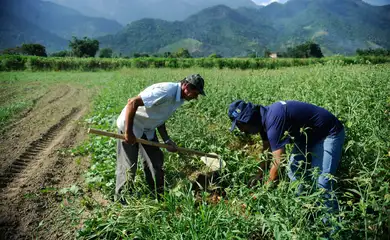Family Farming to receive BRL 76 bi for food production

President Luiz Inácio Lula da Silva launched the 2024/2025 Family Farming Harvest Plan on Wednesday (Jul. 3), allocating BRL 76 billion for rural credit through the National Program to Strengthen Family Farming (Pronaf). This amount represents a 6.2 percent increase over the previous year's allocation and is the largest in the program's history.

Speaking at the event at the Planalto presidential palace, President Lula assured that the government will protect producers from losses and emphasized the need to boost production to combat food inflation.
"[Food prices] rise due to specific weather conditions, such as droughts or excessive rain. Therefore, we must encourage people to plant as much as possible and ensure that, at harvest time, they don't incur losses due to overproduction. The government must guarantee fair payment so that these farmers can get their products to the supermarkets," said President Lula.
According to the government, with additional measures for family farming—including financing small agricultural machinery, expanding rural microcredit, and creating funds to increase access to credit—the total investment reaches BRL 85.7 billion.
Interest rates
The 2024/2025 Family Farming Harvest Plan offers interest rates ranging from 0.5 percent to 6 percent. The federal government is providing additional incentives for those producing food for Brazilian tables and promoting biodiversity. Approximately ten Pronaf rural credit lines have seen rate reductions. For organic, agro-ecological, and socio-biodiversity production, the rates are set at 2 percent for funding and 3 percent for investment. Rice producers will also benefit from reduced rates: 3 percent for conventional rice and 2 percent for organic rice.
In this harvest plan, the government has introduced a new national strategy to expand family farming rice production. The strategy focuses on seven key areas: credit, technical support, seeds, processing, marketing, and option contracts with the establishment of a minimum price for the product.
The president urged unions and organizations to inform producers about the available credits and programs and emphasized the need for oversight to ensure that the funds reach their intended recipients.



